
1. A.Word.A.Day (AWAD)
You can see the word of the day, and yesterday’s word of the day, on the website or through an email subscription. The website is strikingly simple, but highly useful. It provides the pronunciation, meaning, etymology, and usage of the selected word. Below the entry, the owner, Anu Garg, also presents a thought of the day. The New York Times commented that this website is “The most welcomed, most enduring piece of daily mass e-mail in cyberspace.” In fact, it has over a million subscribers from over 170 countries.
2. Merriam-Webster’s Word of the Day
One of the most respected dictionaries in the world, Merriam-Webster has a sophisticated layout for its word-of-the-day page. It provides a definition (with sound of the word spoken included), a “Did you know” section, examples of its usage, a “Name that synonym” section, podcasts, and a word of the day calendar at the bottom. Those who are truly interested in words and their histories, this dictionary will be a treat. Its “Did you know” section is expansive, and allows readers to understand the nuances of each selected word. On the left of the presentation is an easy way to share the word of the day through Facebook, Twitter, and Google Plus. You can even get the word of the day emailed to you through a subscription. It even has a section for learners called a learner’s dictionary. This dictionary also has a word-of-the-day category.
3. Wordnik
This website is all about words, with a word community, word of the day, and random word pages. On its word-of-the-day page, it has concise definitions of words with ample example sentences with the chosen word being used, extra notes on nuances, and also stats on its usage and even its Scrabble score. The fantastic thing about this page is that each word is accompanied with real examples from literature, not just sentences made up on the spot that sound unnatural. So, not only will you learn a new word each day, but also become knowledgeable in literature through this website. It also has an easy-to-access archive, and a convenient way of sharing words via social media.
4. Duolingo
This is perhaps the best language learning app and website out there. In turn, it is a great tool for learning new words. You can compete with your friends and family through the app, so you can gain that motivation needed to learn new words. It has a simple but pleasant layout, with many different exercises for learning: speaking, listening, writing, multiple choice questions, matching word exercises, and more. You can either strengthen what you already know, or venture into the world of new words each day. Duolingo focuses on obtaining a streak, so you know how many days in a row you have been learning a certain language (in our case, it is most likely English). There are many other language learning apps on the market, but it seems Duolingo takes the cake in terms of efficiency, user-friendliness, and motivation. It even has a cute owl mascot that cheers you on as you go through the exercises. I think that most people use the app rather than the website; however, both can be useful. It is important to download the necessary keyboards for the languages you are learning, though.
5. Dictionary.com’s Word of the Day
This is another popular option for learning new words easily. It shows the definitions in the form of a meme or picture you can conveniently share on social media (including showing the pronunciation and what kind of word it is). Below the definitions are citations of the word of the day’s usage from literature. Lastly, there is a section that discusses the origin of the word. You can sign up for an email subscription to the page, and seeing the visual archive of the word of the day for the previous day is just a scroll away.
6. Oxford Dictionary’s Word of the Day
Maybe the most trusted dictionary in the world, the Oxford Dictionary website also has a webpage that features a word of the day. For each entry, you have an audio pronunciation guide, a definition, the word’s origin, and an easy-to-share picture of the word with a pronunciation guide across social media. I like that the Oxford Dictionary focuses on archaic usages of words as well, as for wordaholics, these archaic definitions can be useful to know and interesting to understand. Like most sites of this nature, it also has an email subscription option. Another section of this website to check out if you have time is “Explore the English Language,” which has wordlists and word origin features.
7. New York Times’ Word of the Day
A standard in the news industry, it is also a fantastic tool for learning. The New York Times presents a word of the day daily, attached with a quiz. What is also useful is that it shows words in context of The New York Times itself. So, they will show how the word was used in news articles from the Times. Each entry has sections for definitions, examples of its usage in news articles, and a quiz at the bottom. After you finish the quiz, you will see a more detailed look into the chosen word, discussing its nuances. A great tool for learning more words, and more about them.
8. WordReference.com’s Word of the Day
The special thing about this website is that it offers two categories: basic word of the day, and intermediate word of the day. The basic word of the day is aimed at beginners and the intermediate word of the day is focused on people who have been learning English for some time. Though each category has entries that are filled with detail, there is a clear difference between basic and intermediate entries. In the basic section, entries have sections dedicated definitions, common uses, usage within pop culture, and a button that reads “see full definition,” which leads a user to an elaborated entry. For the intermediate entries, there are sections devoted to expanded definitions, example sentences, words most often used with the chosen entry, usage within pop culture, “did you know,” origins, and once again a “see full definition” button. This seems like the most comprehensive website for learning words and their background stories, so to say. You can get these definitions sent to you by email, and can also share them easily via Facebook and Twitter. You can scroll through entries as if you were on a common blogging site.
9. Vocabulary.com
This website tries its best to make learning new words enjoyable. It has word games to play, you can look up words, and it has word lists. They say if you start playing with language, you will learn it quickly. This website seems to take this approach. When learning is fun and flexible, words will be retained at a better rate. A great thing about its quizzes is that when you answer a question, it will describe the word in detail. The search option has examples sentences written by humans, not computers (it happens often it seems), examples sentences that are in touch with the real world of how English is being used, and claims to be the fastest-working dictionary. Its layout is user-friendly and intuitive. In the lists section, there are myriad lists focused on different subjects, ranging from baseball to movies. It is a highly enjoyable and engaging website for learning new words, and for studying English in general.
10. Word of the Day! App
For people who are crazy about checking other dictionaries for varying definitions, this is the app for them. This app features the following sources:
- Merriam-Webster
- Dictionary.com
- Oxford English Dictionary
- The Free Dictionary
- The Learning Network
- WordSpy
- Latin Word of the Day
- MedTerms
- Yahoo! Education
You can conveniently compare definitions, and discover the nuances of words you want to delve into. In addition, you can “star” and “favorite” certain definitions and words. These starred and favorited words can be shared with friends, and the app will also alert you when new words have been entered into its system. It’s a free app, so it is a catch for those who don’t want to spend to learn. The entries for the words have audio recordings of pronunciation, root meanings, examples sentences, and connotations of chosen words.
In terms of vocabulary development, we were all little geniuses in childhood, learning hundreds of new words every year. By the time we entered first grade, most of us had active vocabularies of several thousand words.
Unfortunately, we weren’t geniuses for very long. By age 11 or 12, equipped with a sizable survival vocabulary, most of us lost some of our early enthusiasm for language, and the rate at which we picked up new words began to decline significantly. As adults, if we don’t make deliberate efforts to increase our vocabularies, we’re lucky to pick up even 50 or 60 new words a year.
The English language has so much to offer (between 500,000 and 1 million words, by most accounts) that it would be a shame to let our vocabulary-building talents go to waste. So here’s one way that we can regain some of our youthful brilliance: learn a new word each day.
Whether you’re a student preparing for the SAT, ACT, or GRE, or simply an unabashed logophile (or lover of words), starting each day with a fresh word can be intellectually nourishing—and more enjoyable than a bowl of All-Bran.
Here are three of our favorite daily word sites: all are free and available through e-mail subscriptions.
A.Word.A.Day (AWAD)
Founded in 1994, A.Word.A.Day at Wordsmith.org is the creation of Anu Garg, an India-born computer engineer who clearly enjoys sharing his pleasure in words. Simply designed, this popular site (nearly 400,000 subscribers from 170 countries) offers concise definitions and examples of words that relate to a different theme every week. The New York Times has called this «the most welcomed, most enduring piece of daily mass e-mail in cyberspace.» Recommended for all word lovers.
Oxford English Dictionary Word of the Day
For many of us, the Oxford English Dictionary is the ultimate reference work, and the OED Word of the Day provides a complete entry (including a wealth of illustrative sentences) from the 20-volume dictionary. You can sign up to have the OED’s Word of the Day delivered by e-mail or RSS web feed. Recommended for scholars, English majors, and logophiles.
Merriam-Webster’s Word of the Day
Less expansive than the OED site, the daily word page hosted by this U.S. dictionary-maker offers an audio pronunciation guide along with basic definitions and etymologies. The Merriam-Webster Word of the Day is also available as a podcast, which you can listen to on your computer or MP3 player. Recommended for high school and college students as well as advanced ESL students.
Other Daily Word Sites
These sites should also be useful to high school and college students.
- Dictionary.com Word of the Day
- The Learning Network (The New York Times)
- The Quotations Page Word of the Day
Of course, you don’t have to go online to learn new words. You can simply begin making a list of new words that you encounter in your reading and conversations. Then look up each word in a dictionary and write down the definition along with a sentence that illustrates how the word is used.
But if you need a little encouragement to work on building your vocabulary every day, sign up for one of our favorite word-a-day sites.
A few days back, we had taken a look at a few resources which helped us with slangs and day to day jargons. Street language sounds hep and helps us to keep up with the times. But it also limits our vocabulary. There’s a word in the English language for every instance, provided we care enough to adopt and use it.
There are only two ways to learn new words — read and use.
Think about it, a word a day translates to nearly 300 words over the course of a year; and many more over a lifetime. An expanded vocabulary not only helps to ace tests like SAT/ACT, but also opens up the language that we speak every day. Read a great speech and see how it moves you. Its oration backed up by a great vocabulary.
So, let’s take it a word at a time and seek the help of these ten websites that teach us new words in different ways.
Wordsmith
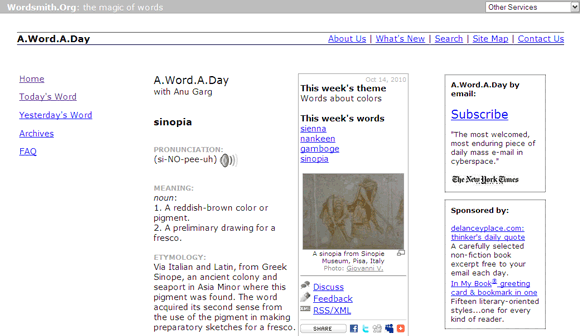
Wordsmith.org is one of the better examples of a stripped down, plain Jane website that hides a lot of usefulness behind its looks. If you have to use just one of the services listed, opt for the daily newsletter. A word a day delivered to your inbox. The screenshot shows how a single word is covered in all its shades.
Weboword [No Longer Available]

A single word each day is illustrated with a cartoon. If you have a visual sort of memory, you won’t have any trouble picking up quite a few words over the course of a month, and learning to use them as they are meant to be. The blog is expecting a rebirth in a new avatar soon.
Wordia

From cartoons to video, visual learning is the new mantra and it seems it’s no different for dictionaries. Wordia functions like a normal dictionary but instead of text definitions, you get videos explaining the usage of a word. The video explanations seem more thorough and easier to grasp than the textual definition. Everyday you can test yourself with Vocability, the Wordia game.
Vocab Vitamins
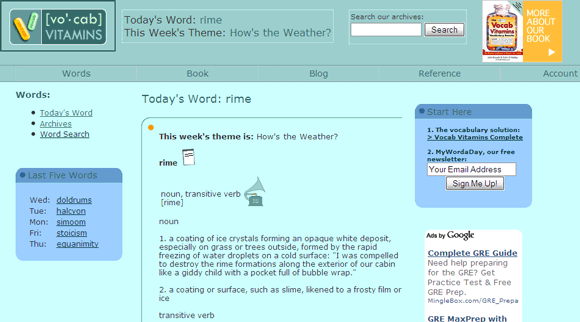
The vocabulary learning tool gives you doses of «˜verbal supplements’ daily in the mail and also on the site. Word of the day is also arranged around a central theme. For instance, the word «˜doldrums’ belongs to the week’s theme — «˜How’s the weather?
[NO LONGER WORKS] Save The Words
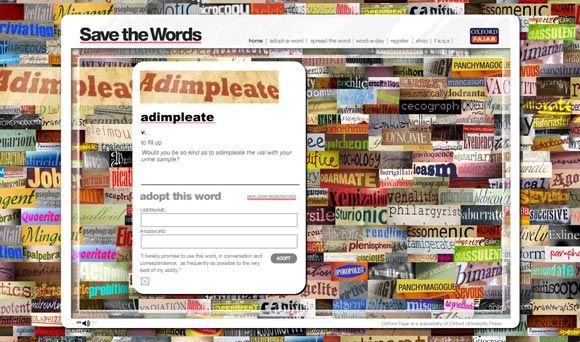
Savethewords.org is a beautifully constructed website that endeavors to focus attention on the lesser known words in the English language. The Oxford Dictionaries site seeks to save these words from going into a state of non-usage and non-existence. The surefire way to do that is to «˜adopt’ a word and use it in daily conversation. The site helps out by sending out word-a-day mailers to those of us who are passionate about words and their meanings. (See [NO LONGER WORKS] Directory mention)
Wordnik
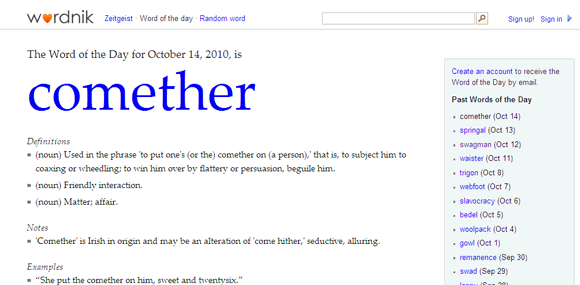
Wordnik.com covers meanings through example sentences to audio pronunciations. Like a lot of online word tools, it aims to go beyond the scope of traditional dictionaries by taking a 360 degree look at a word, the word-of-the-day page and mailer is a shortcut to that process. Wordnik makes it easier to grasp new words by also providing instances of related words and images to describe context.
[NO LONGER WORKS] Phrays
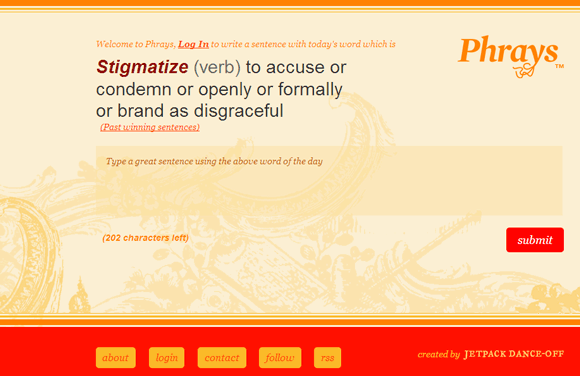
Phrays.com takes a competitive approach to making you learn a word every day. Each day, a word is displayed with its meaning on the site and you have to write a sentence using the word. The sentence with the most user votes is the winner. You can also see the creative Zen of the previous winners that’s also on display in the archives.
WordThink

WordThink.com does not believe in learning new words just its own sake. It bunks the more complicated words and goes in for words that you might use in your daily conversations. You might not find a word like eleemosynary here, but the site might show you benevolent instead. WordThink sources the words from media and news.
Vocabsushi
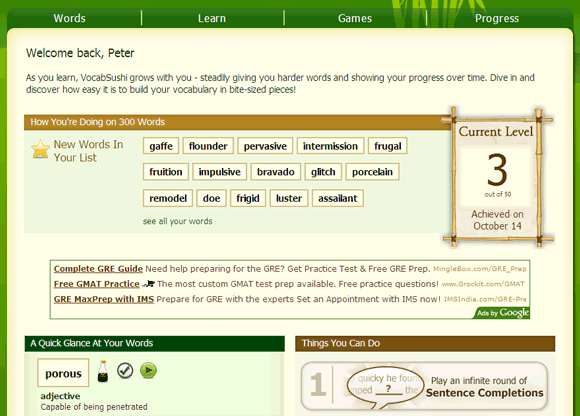
If you are hell bent on acing college tests like ACT, SAT, GMAT, GRE etc, try out Vocabsushi and its bite-size learning method. You can test where you stand with a 20-question Vocabsushi demo quiz right on the front page. Pick a test from the dropdown and have a go at it. If you don’t fare that well, it’s time to dive into Vocabsushi more seriously. Vocabsushi uses thousands of sentences from contemporary news sources that show how a word is used in the real world. The actual words are taken from standardized tests that students have to take. Vocabsushi is a superbly designed site with tools like MP3 clips (for pronunciations), word games, offline quizzes in PDF, etc.
BBC Learning English
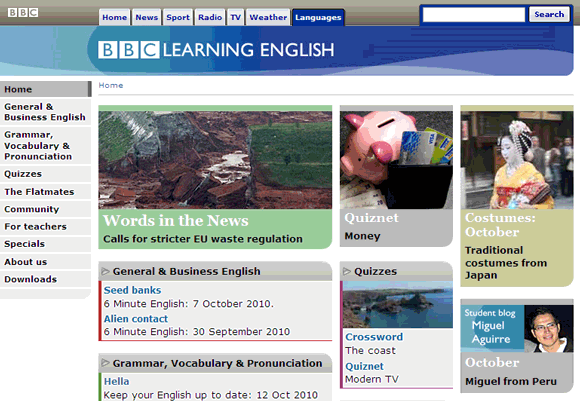
BBC’s world service for the English language doesn’t have a word-a-day mailer or other downloads. But if offers a host of tools that you can use to enrich your vocabulary. Word in the News takes a real news report and highlights specific words with meanings which you can pick up. News English Extra looks at how a word is used in the context of daily news. Then you can Keep your English up to date that explains a word in broad detail. Also, check out the sections like Vocabulary on Football, Tennis, Science etc. Some sections are also covered with downloadable podcasts.
There’s no end to learning new words and adding them to your vocabulary. Words aren’t meant to make you a dictionary on two legs, but to in fact make your conversations simpler. Do you agree?
Image: Shutterstock
8 min
Created: July 13th, 2022Last updated: April 3rd, 2023
Contents
So many people chat easily in English. And then the question naturally arises, why can’t I do that? The essence of the problem lies in the fact that not every one of us has a sufficient vocabulary.
While learning English, not only the rules are important, but also the words. Without a vocabulary, all the rules and formulas for making sentences will simply be useless.
First, understand: it is impossible to remember all the words! This is not related to your laziness, these are purely physiological features of our brain. Don’t blame yourself that you have known and heard something, but forgotten. Just choose the most effective way for you, and answer how to improve your vocabulary in English.
How to Boost Your English Vocabulary
Words are an essential part of the language. If you don’t know them, you won’t be able to express one thought or understand another. To constantly improve your English level, you need practice. But after work, people don’t want to read foreign books or watch movies without translation.
And what if you spend only 15-20 minutes a day learning English? And you don’t have to force yourself, because the process is organized excitingly. You see your progress by the day, compete with other users, exercise pronunciation, and the level is growing rapidly.
All this is implemented in the Promova application, where you can increase your vocabulary by 300 words per month.
12 Ways to Expand Your Vocabulary
There are some tips to improve vocabulary:
1. Learn a few words a day.
Take a list of 15 words every day. That’s enough for a start. Say all the words loudly, clearly, and with different intonations twice in the morning and the evening. Depending on your memory, you can spend two or three days on one list.
2. Read aloud
You should always read aloud. Pronouncing a word will be easier for you to remember not only how it looks, but also how it is pronounced. In addition, you will have a much better chance that you will be able to use the word in speech and improve your vocabulary skills.
But before you learn a word, check its pronunciation. If you immediately remember its pronunciation incorrectly, you are unlikely to retrain.
3. Use household items
Any household items in the house can become your assistants. You can stick stickers with words on them. Some people think that it is ineffective or suitable only for learning banal vocabulary, but it is not. It is important not only to stick papers but also not to forget to work with them. Otherwise, after a week you will stop noticing them, and the words will not be remembered.
4. Special literature
In English, it is called the Vocabulary Resource Pack. Pay attention: these are NOT textbooks. There are many authors and publishers, but the structure of such manuals is about the same. Each has one level of difficulty; the words are collected by topic. After the explanations, several exercises for using and memorizing await you.
5. Constantly use new words in speech
The best thing is to find someone to talk to. The network is full of resources that are created for such mutual pumping of conversational skills. If you are embarrassed to talk to unfamiliar speakers, agree with a friend. 5 minutes of each conversation should be in English.
6. It is necessary to learn new vocabulary and words without taking them out of context
One word in English can have many translation options that are not related to each other in any way.
Therefore, all methodologies recommend memorizing the entire phrase, and sometimes sentences. By no means a specific word, since you can get into an awkward situation by using the wrong word.
7. Films, books and foreign songs will be a very good help to increase vocabulary
You can choose different films, for example, adapted, with or without subtitles, and the genre can be different. The more you watch, the more accents and speech styles you hear. As it turned out, there are a lot of colloquial phrases in films that you can remember and skillfully use in your speech.
Another good helper is a book. It doesn’t matter what kind of books they are, electronic or audio. By reading, you memorize words visually, as well as pronouncing them to yourself, which gives you every chance to expand your vocabulary.
Songs in English are another English vocabulary booster. They will help you develop the skill of speaking, easier assimilation, and memorization of words. Information that sounds like a «background» is sometimes absorbed even more firmly.
8. Do you think what to cook for dinner today? Look for the recipe on an English-language culinary website.
9. Change the language of the settings of your computer, mobile phone, and other gadgets to English.
10. Do you like to keep up to date with events, and read the news daily? Do not neglect English-language news portals.
If you are not familiar with the sociopolitical vocabulary, then you can first read the news in your native language, and then find the same in English. At the same time, you will learn the point of view of the bourgeois press on various events. It is very interesting and often unexpected.
11. Mind map
According to most opinions, this is the coolest way to work with words. For example, choose the theme «Kitchen». You write in the center of the paper «kitchen», and then it’s time for creativity. Draw an arrow and write «food» and everything that fits into this category: potatoes, pasta, meat, onion, cucumber, and so on. Next, you can draw an arrow with actions, for example, what you can do with food: cook, book, peel, cut, slice, blend, and so on.
12. Use visual associations
For example, you learn the names of parts of the world, countries, and capitals. Print out a large contour map and sign all the names in the language you are studying. You see the outline of the country on the map – you understand what kind of country it is – you see its name in a foreign language, as well as the name of the capital. You do not need to compare the name in your native language, you directly build an association with the country and its foreign name.
The same can be done with a calendar for studying the days of the week, months, and numbers, with a wall clock, with objects in the room.
1
Learn Even More Words with Promova
How to learn new vocabulary? Every year new language apps appear in the App Store. It remains only to decide which one is right for you. It is better, of course, to look at those that are based on a scientific methodology.
Instead of starting a diary, or setting an alarm clock, you can use a smart Promova algorithm that will adjust to you and will tell you exactly when and which words should be repeated. The creators of the application promise that if you study for only three to four minutes a day, then in a month you will master 150 new words.
And expanding vocabulary will be guaranteed for a long time.
The words in the application are divided according to the level of complexity and different categories — from travel and chemistry to thematic collections based on popular TV series.
You don’t have to painfully try to figure out which words suit your language level or independently select words on a specific topic.
Another advantage of digital cards is that they are complemented by illustrations, in combination with which words are remembered better.
Conclusion
Vocabulary expansion is one of the indicators of the level of language proficiency. The number of known words is just a number that has no particular value. It is not necessary to strive for certain figures and draw conclusions based on them. But measuring vocabulary still makes sense.
Measuring the number of familiar words will help you track your progress in English. To do this, it is important to use the same methods – for example, always the same vocabulary test. If you take the test 1-2 times a year, you can see the progress. This will help, if necessary, adjust the balance in learning, pay more attention to vocabulary, or motivate you to further improvement.
Everyone learns differently, so if you don’t know what works for you yet, try as many ways or combinations of them as possible: word cards, phone apps, word lists, games, or stickers are great ways to increase your vocabulary. The same applies to finding the right time: some people need an accurate schedule, and others learn spontaneously. But the main thing is to practice systematically. Practice makes everything perfect and possible.
FAQ
How do I remember the new words I’ve learned?
There is only one way to leave a word in memory for a long time: to constantly use it in speech. But if you do not live in a country with an English-speaking population, it is not so easy to follow this rule. Put the most difficult words at the beginning and end of the list. This is called the «edge effect». Memorizing words from the beginning and end of the list are remembered best. So write down there what you can’t master in any way.
How can I improve my English vocabulary fast?
Don’t learn English words in a vacuum. If you come across an unfamiliar word, and you decide to remember it, write down the context in which it was used. If you like a song, read its translation. Write down a quote that you particularly liked. Sing it during the next audition. Also improve your vocabulary with movies, music videos, and books.
There is no single indicator of whom, how and in what time should remember words. If suddenly something did not work out the first time, do not scold and do not blame yourself for it. Just go from the other side, look at the situation from a different angle, and in no case compare yourself with others. Everyone has an individual pace of learning a foreign language.
How do you learn new words daily?
Every day we have to assimilate and memorize large amounts of information. The process of memorizing is time-consuming, but properly selected methods will help to cope with this task. The main thing is to overcome laziness and find an interesting approach for you. Then memorizing words will not be a daily routine. Divide words into semantic blocks. Do not learn words out of context — immediately use them in speech. Periodically return to the studied material. Learn words piecemeal and don’t try to memorize everything at once. And be sure to combine memorization techniques. In order not to overload the memory, we advise you not to chase a lot of words. If you plan to study daily or at least every other day, 15 words will be enough.
Which app is best for learning English vocabulary?
If you are interested in services that help you memorize English words, we recommend Promova. Thanks to this resource, you will understand how it is easier to remember English words.
Promova will help you memorize new words every day and return to them at increasing intervals. The program will remind you when you need to repeat the words, in the specified order and with the desired frequency.
How can I learn new words daily?
- RSS
Get it in your inbox.
Fill out your email address to get Word of the Day in your email every day. Each language you sign up for will appear in your daily email.

Subscribe to Word of the Day
Join our Facebook community.
Get Word of the Day in your Facebook feed, along with blog updates, language-related news, and more. Our communities invite both experts and learners to join in discussion.
Join us on Facebook


Follow a language on Twitter.
Receive daily tweets of the Word of the Day. Follow any language of your choice and it will arrive in your Twitter stream.
Follow a Language



